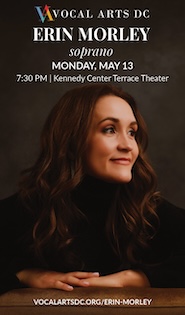Ailyn Pérez makes a triumphant return to Wolf Trap

Ailyn Pérez performed a recital Friday night at Wolf Trap. Photo: Rebecca Fay
When Ailyn Pérez burst onto the stage at Wolf Trap, in the summer of 2006, the American soprano had just finished her graduate studies. She was a sensation then, with some raw edges, but she has gone on to an even brighter career.
The voice has continued to sparkle and bloom in regular appearances at major venues, including Santa Fe Opera over the years. Now, a decade later, she returned to the Barns at Wolf Trap on inauguration night for one of that presenter’s alumni recitals, having just concluded an acclaimed run as Mimi in Puccini’s La Bohème at the Metropolitan Opera.
The program was almost identical to Pérez’s solo album Poème d’un jour, released in 2013 on the Opus Arte label. In three sets of Spanish songs, Pérez displayed a striking fluency in language and musical idiom, having grown up speaking the language as the child of Mexican immigrants. In a selection of songs from the Canciones Clásicas Españolas by Spanish composer Fernando Obradors, intense vocalises on hummed notes and colorful characterization combined for vivid story telling. Her tone has filled out admirably, including a more ample and full sound at the bottom of the range as displayed in the first song, “La mi sola, Laureola.” The two closing songs demonstrated an extended range of vocal color, with a shimmering softness in “Del cabello más sutil” contrasted with the lusty swagger of “Chiquitita la novia.”
Kim Pensinger Witman, music director of the Wolf Trap Opera, showed consummate skill as her accompanist, always at the right level of volume and force to support a singer, an ease gleaned from years of coaching experience. Witman had an accomplished sense of rhythmic flexibility, too, with a tendency toward soft and delicate sounds, although “Dedicatoria,” the opening solo piano piece of Poema en forma de canciones by Joaquín Turina, did not have the same confidence. With Pérez singing, it was a different story, especially in the contrasting moods of “Cantares” and “Los dos miedos.”
Manuel de Falla’s Siete Canciones Populares Españolas, a showpiece for a singer with flair like Pérez, provided the big finish. She offered a smoother, more contained sound in the intimate songs like “El paño moruno” and the hypnotic lullaby “Nana,” while broadening the tone considerably for the saucy, extroverted style of “Seguidilla Murciana.” In the tragic “Asturiana” she created a sort of weightlessness playing off the harmonic tension of the piece. Having scaled her dynamics quite beautifully to the smaller venue, she opened the throttle for a thrilling, impassioned conclusion in the final song, “Polo.”
Two sets of French songs were also beautiful, if without the same natural simplicity of the Spanish pieces. Pérez’s time in major opera houses has given her impeccable pronunciation in French, which was easy to understand without having to refer to the texts in the program. In Gabriel Fauré’s “Rencontre,” the first song in the set Poème d’un jour, Pérez took the challenges to her breath support in stride, spinning out the final phrase effortlessly after a minor struggle earlier in the piece. The chatty stream of words in “Toujours” had a delightful restlessness, conveying the agitation of the lover who will not be put off, while “Adieu” offered the most subtle interpretation of the entire program, a silken legato murmured in an unbroken ribbon of charming half-line rhymes.
In the other French set, five songs by Reynaldo Hahn, Pérez did not quite reach the same level of artless serenity, so important for French mélodie to be lifted off the page. Both “À Chloris” and “L’heure exquise,” while pretty, fell short of the mark she had reached in the Fauré songs. In the final song, “Le printemps,” Pérez could expand her voice again into a more full-throated tone, which made for an exciting conclusion.
The first of two encores, “Children will listen” from Sondheim’s Into the Woods, was a disappointment, the audible lack of familiarity with the piece reinforced visually by Pérez’s use of a score. On the other hand a second encore, Mimi’s aria “Donde lieta uscì” from Puccini’s La Bohème, revealed the full power and pathos of Pérez’s operatic voice, making it a true showstopper.



